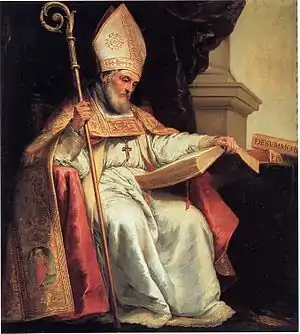Introduction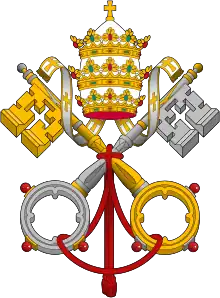 The Catholic Church, also known as the Roman Catholic Church, is the largest Christian church, with 1.3 billion baptized Catholics worldwide It is among the world's oldest and largest international institutions, and has played a prominent role in the history and development of Western civilization. The church consists of 24 sui iuris churches, including the Latin Church and 23 Eastern Catholic Churches, which comprise almost 3,500 dioceses and eparchies located around the world. The pope, who is the bishop of Rome, is the chief pastor of the church. The Diocese of Rome, known as the Holy See, is the central governing authority of the church. The administrative body of the Holy See, the Roman Curia, has its principal offices in Vatican City, a small independent city-state enclave within the Italian capital city of Rome, of which the pope is head of state. The core beliefs of Catholicism are found in the Nicene Creed. The Catholic Church teaches that it is the one, holy, catholic and apostolic church founded by Jesus Christ in his Great Commission, that its bishops are the successors of Christ's apostles, and that the pope is the successor to Saint Peter, upon whom primacy was conferred by Jesus Christ. It maintains that it practises the original Christian faith taught by the apostles, preserving the faith infallibly through scripture and sacred tradition as authentically interpreted through the magisterium of the church. The Roman Rite and others of the Latin Church, the Eastern Catholic liturgies, and institutes such as mendicant orders, enclosed monastic orders and third orders reflect a variety of theological and spiritual emphases in the church. Of its seven sacraments, the Eucharist is the principal one, celebrated liturgically in the Mass. The church teaches that through consecration by a priest, the sacrificial bread and wine become the body and blood of Christ. The Virgin Mary is venerated as the Perpetual Virgin, Mother of God, and Queen of Heaven; she is honoured in dogmas and devotions. Catholic social teaching emphasizes voluntary support for the sick, the poor, and the afflicted through the corporal and spiritual works of mercy. The Catholic Church operates tens of thousands of Catholic schools, universities and colleges, hospitals, and orphanages around the world, and is the largest non-government provider of education and health care in the world. Among its other social services are numerous charitable and humanitarian organizations. (Full article...) Selected article 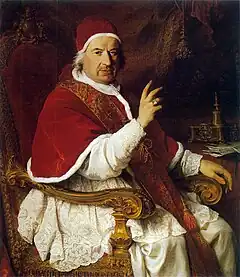 Pope Benedict XIV promulgated Vix Pervenit in 1745. Vix Pervenit: On Usury and Other Dishonest Profit was an encyclical, promulgated by Pope Benedict XIV on November 1, 1745, which condemned the practice of charging interest on loans as usury. Because the encyclical was addressed to the Bishops of Italy, it is generally not considered ex cathedra. The Holy Office applied the encyclical to the whole of the Roman Catholic Church on July 29, 1836, during the reign of Pope Gregory XVI. The encyclical codified Church teachings which date back to early ecumenical councils, at a time when scholastic philosophy (which did not regard money as a productive input) was increasingly coming into conflict with capitalism. Though never formally retracted, the encyclical's relevance has faded as the Church retreated from actively enforcing its social teachings in the financial sphere, and as the practice of charging interest on loans became almost universally accepted—legally and ethically.
Selected image 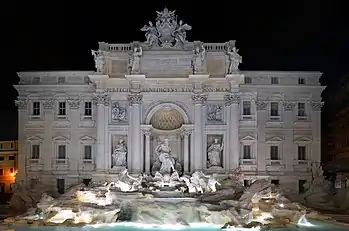 Credit: LivioAndronico The Trevi Fountain is the largest — standing 25.9 meters (85 feet) high and 19.8 meters (65 feet) wide — and most ambitious of the Baroque fountains of Rome. Competitions had become the rage during the Baroque era to design buildings, fountains, and even the Spanish Steps. In 1730 Pope Clement XII organized a contest in which Nicola Salvi initially lost to Alessandro Galilei — but due to the outcry in Rome over the fact that a Florentine won, Salvi was awarded the commission anyway. Work began in 1732, and the fountain was completed in 1762, long after Clement's death, when Pietro Bracci's 'Neptune' was set in the central niche. Selected biography
Did you know... 
Related portalsFeast Day of December 6 Prayer: Glorious St. Nicholas, my special patron, from thy throne in glory, where thou dost enjoy the presence of God, turn thine eyes in pity upon me and obtain for me from our Lord the graces and helps that I need in my spiritual and temporal necessities (and especially this favor [petition or intercede here], provided that it be profitable to my salvation). Be mindful, likewise, O glorious and saintly Bishop, of our Sovereign Pontiff, of Holy Church, and of all Christian people. Bring back to the right way of salvation all those who are living steeped in sin and blinded by the darkness of ignorance, error, and heresy. Comfort the afflicted, provide for the needy, strengthen the fearful, defend the oppressed, give health to the infirm; cause all men to experience the effects of thy powerful intercession with the supreme Giver of every good and perfect gift. Amen. (Our Father, Hail Mary, Glory Be) V. Pray for us, O blessed Nicholas. R. That we may be made worthy of the promises of Christ. Let us pray. O God, who has glorified blessed Nicholas, Thine illustrious Confessor and Bishop, by means of countless signs and wonders, and who dost not cease daily so to glorify him; grant, we beseech Thee, that we, being assisted by his merits and prayers, may be delivered from the fires of hell and from all dangers. Through Christ our Lord. Amen.
Selected quote 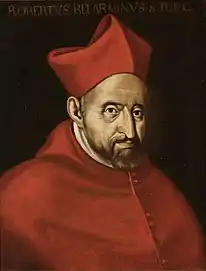 Robert Bellarmine, SJ, Doctor of the Church
— Robert Bellarmine Decree on the Bishops' Pastoral Office
News
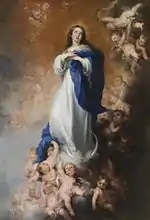
Subcategories Catholic Church Catholic Church by city Catholic Church by continent Catholic Church by country Catholic Church-related lists Catholic particular churches sui iuris Latin Church Eastern Catholic Churches Catholic bibles Buildings and structures of the Catholic Church Catholics Catholic charities Catholic culture Catholic dioceses Ecclesiastical polity of the Catholic Church Catholic ecumenical and interfaith relations History of the Catholic Church Catholic hymns Catholic liturgy Catholic missions Catholic orders and societies Catholic Church organisation Catholic organizations Popes Catholic Church in popular culture Roman Catholic saints Catholic spirituality Catholic studies Catholic theology and doctrine Venerated Catholics Catholic Church portals Outlines of the Catholic Church Catholic Church stubs Topics
The Holy Bible:
Particular Churches (grouped by liturgical rite):
Things you can do
External resourcesWikiProjects
Associated WikimediaThe following Wikimedia Foundation sister projects provide more on this subject:
Discover Wikipedia using portals
|
.jpg.webp)
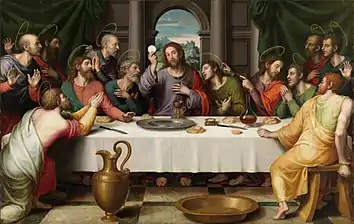

.svg.png.webp)
.svg.png.webp)




